Maritime transportation company Matson (NYSE:MATX) met Wall Street’s revenue expectations in Q3 CY2024, with sales up 16.3% year on year to $962 million. Its GAAP profit of $5.89 per share was 24.1% above analysts’ consensus estimates.
Is now the time to buy Matson? Find out by accessing our full research report, it’s free.
Matson (MATX) Q3 CY2024 Highlights:
- Revenue: $962 million vs analyst estimates of $965.7 million (in line)
- EPS: $5.89 vs analyst estimates of $4.75 (24.1% beat)
- EBITDA: $289.4 million vs analyst estimates of $243.9 million (18.7% beat)
- Gross Margin (GAAP): 32%, up from 24.6% in the same quarter last year
- Operating Margin: 25.2%, up from 16% in the same quarter last year
- EBITDA Margin: 30.1%, up from 21.2% in the same quarter last year
- Free Cash Flow Margin: 19.6%, up from 11% in the same quarter last year
- Market Capitalization: $4.51 billion
Company Overview
Founded by a Swedish orphan, Matson (NYSE:MATX) is a provider of ocean transportation and logistics services.
Marine Transportation
The growth of e-commerce and global trade continues to drive demand for shipping services, presenting opportunities for marine transportation companies. While ocean freight is more fuel efficient and therefore cheaper than its air and ground counterparts, it results in slower delivery times, presenting a trade off. To improve transit speeds, the industry continues to invest in digitization to optimize fleets and routes. However, marine transportation companies are still at the whim of economic cycles. Consumer spending, for example, can greatly impact the demand for these companies’ offerings while fuel costs can influence profit margins. Geopolitical tensions can also affect access to trade routes, and if certain countries are banned from using passageways like the Panama Canal, costs can spiral out of control.
Sales Growth
Reviewing a company’s long-term performance can reveal insights into its business quality. Any business can have short-term success, but a top-tier one sustains growth for years. Thankfully, Matson’s 8.3% annualized revenue growth over the last five years was decent. This is a useful starting point for our analysis.
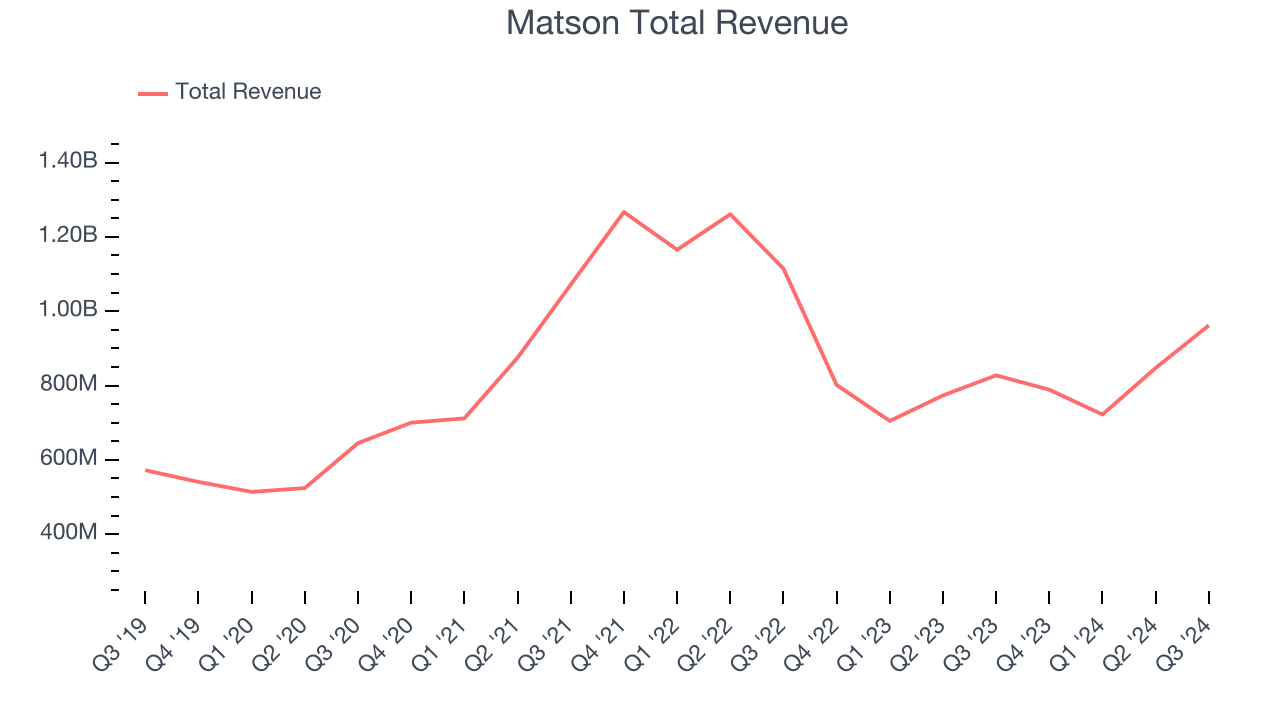
Long-term growth is the most important, but within industrials, a half-decade historical view may miss new industry trends or demand cycles. Matson’s recent history marks a sharp pivot from its five-year trend as its revenue has shown annualized declines of 16.9% over the last two years. Matson isn’t alone in its struggles as the Marine Transportation industry experienced a cyclical downturn, with many similar businesses seeing lower sales at this time. 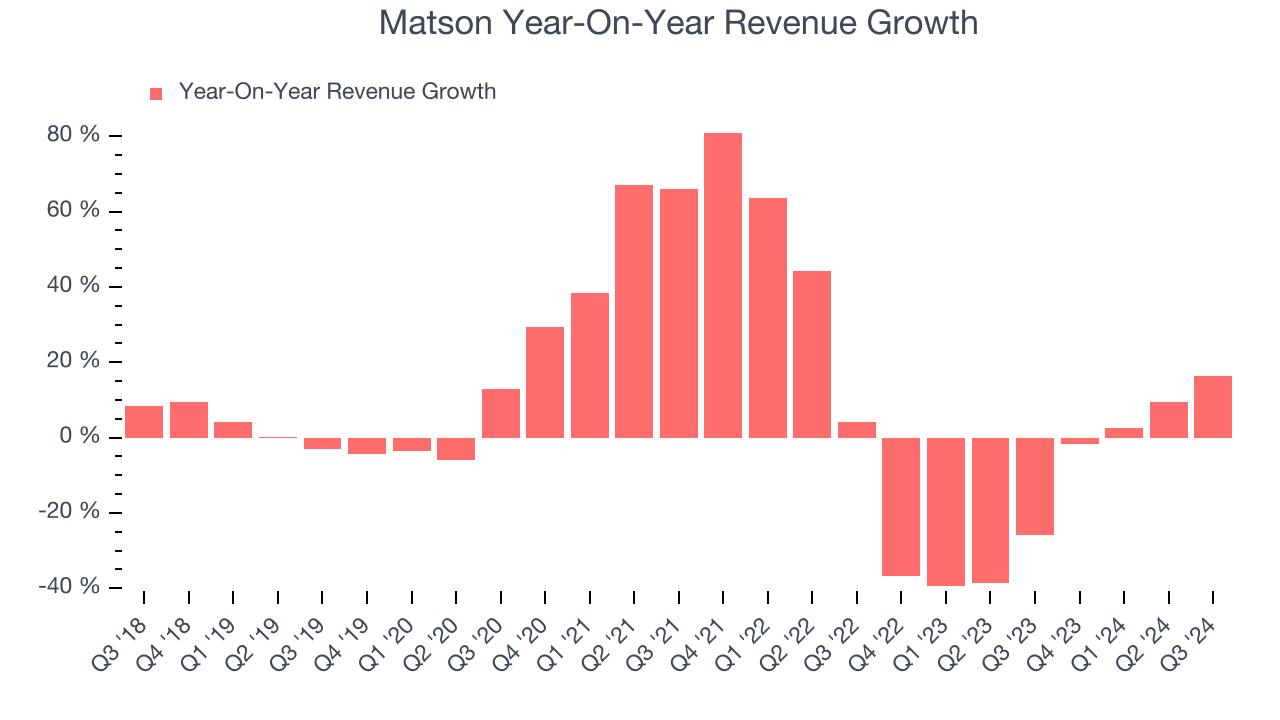
This quarter, Matson’s year-on-year revenue growth was 16.3%, and its $962 million of revenue was in line with Wall Street’s estimates.
Looking ahead, sell-side analysts expect revenue to remain flat over the next 12 months, an improvement versus the last two years. Although this projection illustrates the market thinks its newer products and services will fuel better performance, it is still below average for the sector.
Here at StockStory, we certainly understand the potential of thematic investing. Diverse winners from Microsoft (MSFT) to Alphabet (GOOG), Coca-Cola (KO) to Monster Beverage (MNST) could all have been identified as promising growth stories with a megatrend driving the growth. So, in that spirit, we’ve identified a relatively under-the-radar profitable growth stock benefitting from the rise of AI, available to you FREE via this link.
Operating Margin
Operating margin is one of the best measures of profitability because it tells us how much money a company takes home after procuring and manufacturing its products, marketing and selling them, and, most importantly, keeping them relevant through research and development.
Matson has been a well-oiled machine over the last five years. It demonstrated elite profitability for an industrials business, boasting an average operating margin of 21.4%. This result was particularly impressive because of its low gross margin, which is mostly a factor of what it sells and takes huge shifts to move meaningfully. Companies have more control over their operating margins, and it’s a show of well-managed operations if they’re high when gross margins are low.
Looking at the trend in its profitability, Matson’s annual operating margin rose by 6 percentage points over the last five years, showing its efficiency has meaningfully improved.
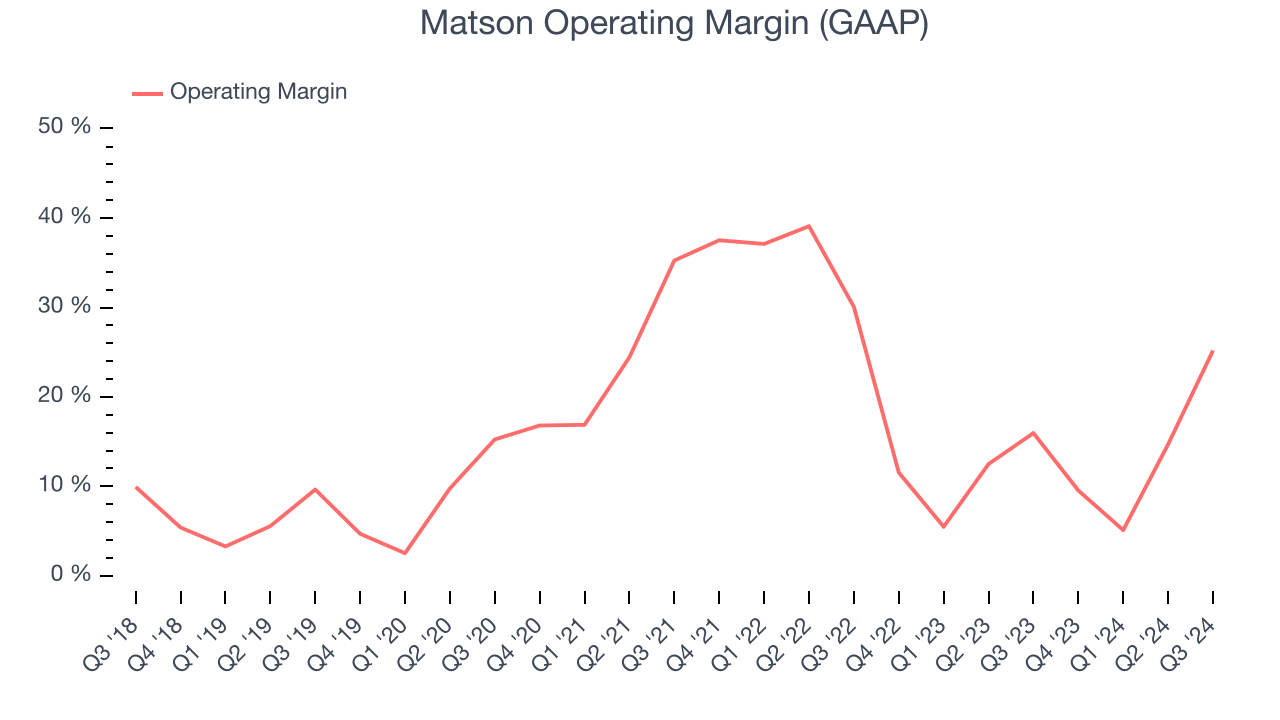
This quarter, Matson generated an operating profit margin of 25.2%, up 9.2 percentage points year on year. The increase was solid, and since its operating margin rose more than its gross margin, we can infer it was recently more efficient with expenses such as marketing, R&D, and administrative overhead.
Earnings Per Share
Analyzing revenue trends tells us about a company’s historical growth, but the long-term change in its earnings per share (EPS) points to the profitability of that growth – for example, a company could inflate its sales through excessive spending on advertising and promotions.
Matson’s EPS grew at an astounding 42.7% compounded annual growth rate over the last five years, higher than its 8.3% annualized revenue growth. This tells us the company became more profitable as it expanded.
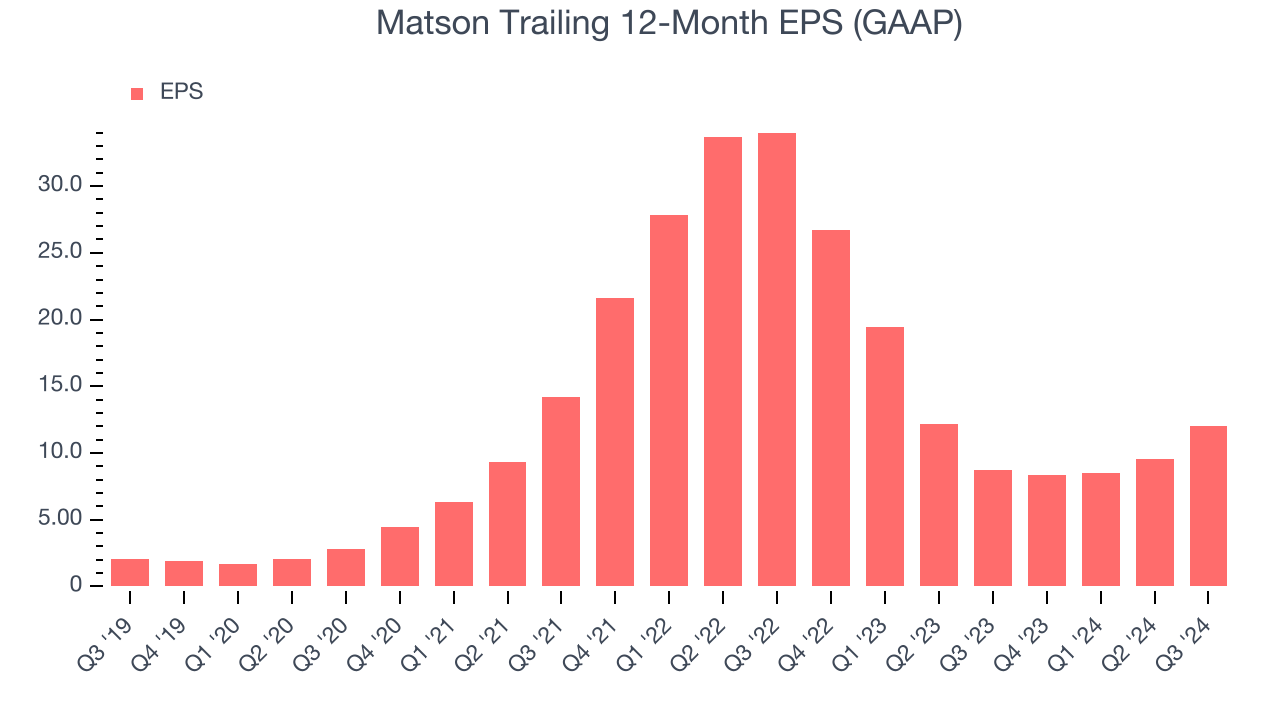
Diving into Matson’s quality of earnings can give us a better understanding of its performance. As we mentioned earlier, Matson’s operating margin expanded by 6 percentage points over the last five years. On top of that, its share count shrank by 21.9%. These are positive signs for shareholders because improving profitability and share buybacks turbocharge EPS growth relative to revenue growth. 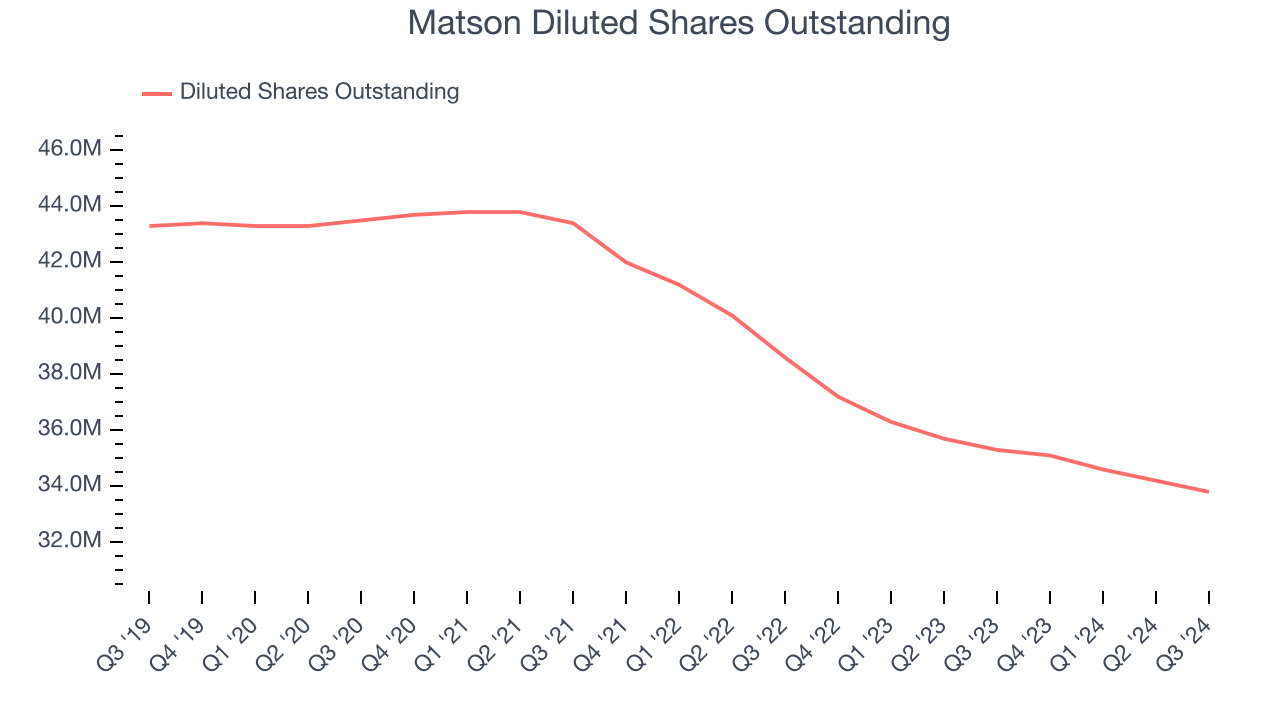
Like with revenue, we analyze EPS over a shorter period to see if we are missing a change in the business.
For Matson, its two-year annual EPS declines of 40.5% mark a reversal from its (seemingly) healthy five-year trend. We hope Matson can return to earnings growth in the future.In Q3, Matson reported EPS at $5.89, up from $3.40 in the same quarter last year. This print easily cleared analysts’ estimates, and shareholders should be content with the results. Over the next 12 months, Wall Street expects Matson’s full-year EPS of $12.02 to shrink by 19.2%.
Key Takeaways from Matson’s Q3 Results
We were impressed by how significantly Matson blew past analysts’ EBITDA expectations this quarter. We were also excited its EPS outperformed Wall Street’s estimates. On the other hand, its revenue missed. Zooming out, we think this quarter featured some important positives. The stock remained flat at $134.88 immediately after reporting.
Indeed, Matson had a rock-solid quarterly earnings result, but is this stock a good investment here? We think that the latest quarter is only one piece of the longer-term business quality puzzle. Quality, when combined with valuation, can help determine if the stock is a buy. We cover that in our actionable full research report which you can read here, it’s free.
